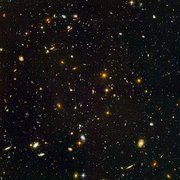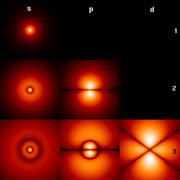Nature
|
|
- For alternative meanings, see nature (disambiguation).


Aphthona_flava_flea_beetle.jpg
Nature (also called the material world, the material universe, the natural world, and the natural universe) is all matter and energy, especially in its essential form. Nature is the subject of scientific study. In scale, "nature" includes everything from the universal to the subatomic. This includes all things animal, plant, and mineral; all natural resources and events (hurricanes, tornadoes, earthquakes). It also includes the behaviour of living animals, and processes associated with inanimate objects.
| Contents |
Nature outside Earth and its atmosphere
Events and phenomena outside Earth and its atmosphere are in the natural science of astronomy.
Life
Life, the characteristics and behaviors of organisms, how species and individuals come into existence, and the interactions they have with each other and with their environment are all in the natural science of biology.
Chemicals
The structure, properties, composition, and reactions of chemical elements and compounds are part of the natural science of chemistry.
Matter and force
The behaviour and interactions of matter and force are a part of the natural science of physics.
Earth
Everything relating to the planet Earth is a part of earth science.
The supernatural
Main article: Supernatural
Most people believe in the existence of a non-material world in a sense beyond that of just mental experience. They rather believe in supernatural beings and in a supernatural reality absolutely different in kind to that of the natural world. If such a reality exists, many scientists and others assert that it is beyond the reach of science. Science has been very successful in bringing apparently inexplicable and supposedly supernatural phenomena within its scope. Nevertheless, many scientists believe in supernatural.
Metaphysics
In philosophy, the view that the material world of atoms, animals, gravity, stars, wind, microbes, etc., actually exist independently of our observations of them is termed realism; the opposing view is called idealism.
The natural and the artificial
A distinction is often drawn between the "natural" and the "artificial" (="man-made"). Can such a distinction be justified? One approach is to exclude mind from the realm of the natural; another is to exclude not only mind, but also humans and their influence. In either case, the boundary between the natural and the artificial is a difficult one to draw (see mind-body problem). Some people believe that the problem is best avoided by saying that everything is natural, but that does little to clarify the concept of the "artificial". In any event, ambiguities about the distinction between the natural and the artificial animate much of art, literature and philosophy.
Another approach is to distinguish natural processes and artificial (man-made) processes. In this viewpoint, a process is deemed to occur either at the behest of man, or not. For example, flipping a light switch might illuminate a room, or perhaps a sunrise might illuminate that room. In this viewpoint, the sunrise would be termed a natural process; the decision of a human being to flip the light switch would be termed an artificial illumination, in contrast. In this viewpoint, artifice (art or literature) is clearly the result of willful human action; furthermore, the act of stating a philosophical position could also a willful action (and hence at the behest of man), whether or not the content of the philosophy were to be about science.
Related concepts
The term natural science is used in a variety of ways, primarily:
- to denote the study of natural processes as opposed to human activities, in contrast to the social sciences; and
- to denote those sciences which employ the scientific method, in contrast, for example, to mathematics or computer science.
The term natural philosophy formerly named the scientific discipline now known as physics.
Natural theology straddles the disciplines of theology and philosophy of religion.
In education and related areas, the contrast "natural/artificial" can appear as " nature/nurture".
See also: praeternatural, unnatural and supernatural.
Etymology
The word nature comes from the Latin word, natura, meaning birth or character (see nature (innate)). In English, its first recorded use in the sense of the entireity of the phenomenon of the world was in 1662, however Natura was widely popular in the Middle Ages and can be traced to Ancient Greece in origin.
The pre-Socratic philosophers of Greece invented Nature, they abstracted the entirety of phenomenon of the world into a single name and spoken of as a single object. Later Greek thinkers such as Aristotle were not as entirely inclusive, excluding the stars and moon, the "Supernatural", from Nature. Thus from this object, existing inside a larger framework and not inclusive of everything, Nature could become personified, and it is from this we have the origins of a mythological goddess Nature. Later Medieval writers also did not see Nature as inclusive of everything, but that she was created by God, her place lay on earth, below the heavens and moon. Nature lay somewhere in the middle, with agents above her (angels) and below her (daemons and hell). For the Medieval mind she was only a personification, not a goddess. The modern concept of Nature, all inclusive of all phenomenon, has returned to its original pre-Socratic roots no longer a personification or deity except in a rhetorical sense, a bow to her illustrious traditions.1
Notes
- Note 1: C.S. Lewis, The Discarded Image: An Introduction to Medieval and Renaissance Literature, pp.34-39, ISBN 0521477352
See also
- Biophilia
- Naturefriends
- Natural units (Planck units)
- Materialism
- Naturalism (Philosophy): the philosophical stance based on Materialism and Pragmatism that rejects the validity of explanations making use of entities inaccessible to natural science (compare with supernatural).
External links
- James Randi Educational Foundation (http://randi.org/) The JREF organization investigates claims that seem to contradict established science and attempts to verify them in controlled experimental conditions. There has been no success yet finding any evidence in these controlled conditions specified by the Foundation of anything not explainable by established science.
- The Nature Conservancy (http://nature.org/) Charitable organization devoted to preserving natural diversity worldwide
- English Nature (http://www.english-nature.org.uk/) UK government organization devoted to preserving natural diversity in the UK
- Nature Detectives (http://www.naturedetectives.org.uk) An online research and education project for under 18s in the UK
- A Guide to Nature and Wildlife Conservation (http://www.takesomeaction.co.uk)ast:Natura
be:Прырода bn:প্রকৃতি ca:Natura da:Natur de:Natur et:Loodus el:Φύση es:Nature eo:Naturo fr:Nature he:עולם הטבע io:Naturo it:Natura lt:Gamta minnan:Chū-jiân nl:Natuur ja:自然 os:Æрдз pl:Natura pt:Natureza ru:Природа simple:Nature sl:Narava fi:Luonto zh:自然
